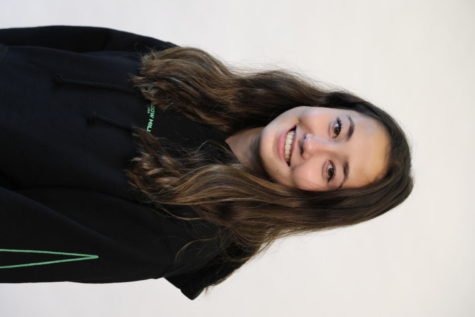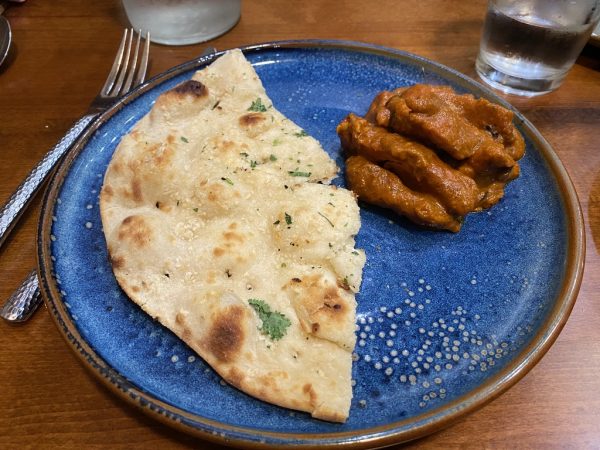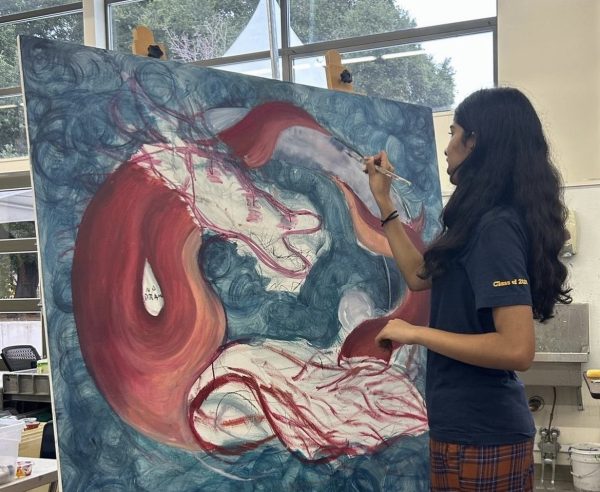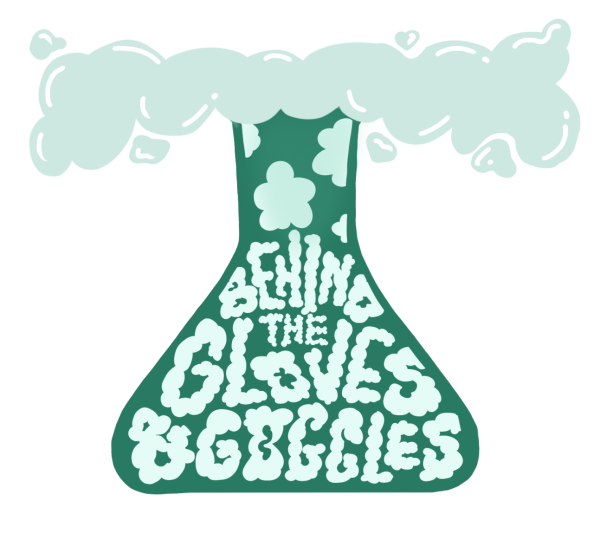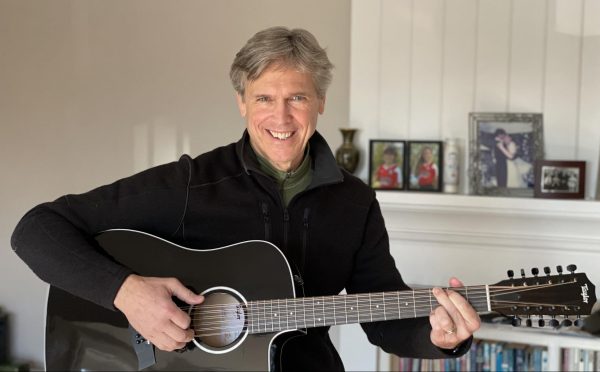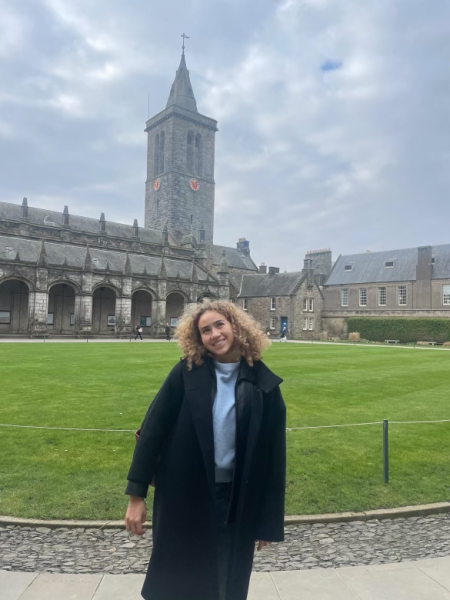Student Opinions on AP Courses
The menlo community shares mixed opinions on the role APs should have in a student’s schedule. Staff illustration: Sutton Inouye.
March 8, 2022
Every year, Menlo students fill up their schedules with up to seven classes. However, these decisions are not only influenced by what classes seem interesting, but also by what classes might look impressive to colleges on a high school transcript. Many students choose to participate in Advanced Placement (AP) classes, which are college-level courses that prepare students to take an AP exam at the end of the school year, presented by the College Board.
Junior Eddie Fujimori took three AP classes last year, and this year he is currently taking five. Among all of these courses, according to Fujimori, AP Latin Vergil has been the most time consuming. Fujimori also noticed that everyone in his Latin class is at approximately the same level, whereas in other APs, people are in different places. “AP Latin is definitely equally difficult for everyone in my class,” Fujimori said. “But for all the other APs I’ve taken, there’s students that have it much easier than others.”
Similar to Fujimori, senior Kayla Davis took AP Latin last year, and she thought it was her hardest AP by far. “AP Latin was really really difficult because there’s so many grammar rules, vocab learning and then translating,” Davis said. “And then you add in history, and the entire ablative case.” In addition to Latin, Davis thought that AP European History was difficult because of the amount of memorization involved.
Although junior William Floyd is also a student in AP Latin this year, he doesn’t think of it as his hardest course. According to Floyd, he thought AP Physics 2, which he took as a sophomore, was much more challenging. “It was the hardest to conceptually understand the material in physics,” Floyd said. “I definitely think that some APs are a little easier than others.”
Juniors Felix Liu and Aidan Zhou both agree that AP English Language has been their most difficult AP course this year. Liu’s interests are more STEM-related, which is why he finds the class tough. “I feel like the class is very subjective, and I’m not good at English in general,” Liu said.
Unlike Liu, junior Ralston Raphael believes that English is his strongest subject, which is what motivated him to take AP English Literature this year. This is the first AP level course Raphael has taken, and he is happy with his decision. “I take the class because I love analyzing literature. It’s like a puzzle,” Raphael said. Even though some students argue that there are not enough Humanities AP classes offered at Menlo, Raphael disagrees. “I think that there are enough [English AP classes] because English is mainly made of two components: writing and reading,” Raphael said. According to Raphael, he couldn’t think of any other English classes that would function well at an AP level besides AP Language and AP Literature. Junior Ellie Hardegree is also taking AP Literature, and she finds that it is the hardest AP she has taken so far. “[The class] really pushes my writing skills,” Hardegree said. Similar to Raphael, Hardegree agrees that there have been enough AP courses in the Humanities department throughout her Menlo experience.
Junior Evelyn Zhou finds that AP Calculus BC is her hardest AP class this year. In addition to AP Calculus BC, Zhou currently takes AP French Language and Culture, AP English Literature and AP Statistics. Although Zhou is more STEM-oriented, she agrees that there aren’t many Humanities options available at Menlo. “Menlo provides a lot of APs in STEM, but not enough in Humanities,” Zhou said. “A lot of my friends have been saying it would be nicer if Menlo was more Humanities friendly in terms of offering AP classes.”
Junior Isabel Cordon is currently taking three AP classes, but she finds AP Chemistry the most challenging. “I was in Conceptual Chemistry last year, so I wasn’t really prepared for the math in AP [Chemistry],” Cordon said. “I also think there’s a stigma around taking a lot of AP classes at Menlo, and since I liked chemistry, I felt like I needed to take AP [Chemistry].” According to Cordon, there are lots of resources for mastering the content, but she still ends up doing lots of extra work to catch up with classmates that were in Honors Chemistry last year.
Similar to Cordon, seniors Zoe Gregory and Emory Tudor thought that AP Chemistry was their most demanding AP. “The concepts sometimes in chemistry are incredibly abstract,” Tudor said. Tudor agreed that they had to spend a lot of time mastering the concepts outside of class and homework assignments, but there were also many provided resources to help, such as online chemistry textbooks and notes. According to Gregory, she enrolled in chemistry because she was genuinely interested in the subject. Gregory believes that if she had taken an AP class she wasn’t necessarily excited about, then she’d find it even more challenging. “I think every AP class has a pretty different level of difficulty. It also really just depends on what your strengths and weaknesses are as a person, and what subjects you’re interested in,” Gregory said.
Senior Kahaan Gandhi also thought that chemistry was his hardest AP class, but not for the same reason as Cordon and Tudor. According to Gandhi, since he was more interested in some of his other AP classes, he found chemistry more difficult in comparison. Gandhi does not believe that there is necessarily an AP class that should be deemed the most difficult. Instead, he thinks that an AP class will be hard when a student takes it for the wrong reasons.
Junior Michele Hratko’s most difficult subject this year is AP Spanish Language and Culture because its content feels unpredictable at times. “There are simulated conversations and cultural presentations where you have to talk about a random topic with very little time to prepare,” Hratko said. “It’s challenging because it requires you to both have knowledge about the topic and also be able to explain it in Spanish.”
Hratko also thinks that there is pressure to take AP classes, similar to Cordon. “Everyone takes AP classes at Menlo, so if you want to be comparable to the rest of your class, you take APs,” Hratko said. Hratko’s favorite AP class is AP Art, since it involves her creative side.
Menlo uses a 4.0 grade point average scale, and students’ grades are adjusted upward by .5 in honors or AP courses. Because both AP and honors classes have the same GPA boost, some students prefer honors classes, including Tudor. “I take a lot more honors classes because then I don’t have to take an AP exam at the end of the year,” Tudor said. Tudor believes that AP exams don’t really reflect a student’s performance in a given class. “I don’t think they necessarily prove that you actually learned anything,” Tudor said. “They just proved that you studied for a test.”
Davis, Hardegree and Gandhi also have issues with the College Board, similar to Tudor. “A lot of the AP classes are very by-the-book,” Davis said. “It’s supposed to be standardized across the gap. And, even if you take the AP exam, you’re not guaranteed a score that will help you get college credit.” In Davis’ experience, the AP exam scores don’t seem to accurately reflect what she’s learned in her classes.
“I feel like some things on the AP tests aren’t very meaningful to my education, and I still feel pressured to work in those areas,” Hardegree said. Tudor also pointed out that they find honors classes more intriguing, since they really dig deep on specific subjects, whereas AP classes are designed to be pretty general and cover more content. “People usually take APs because they think it will look good, but in reality, if you don’t enjoy the subject, then it will be a hard class,” Gandhi said.



